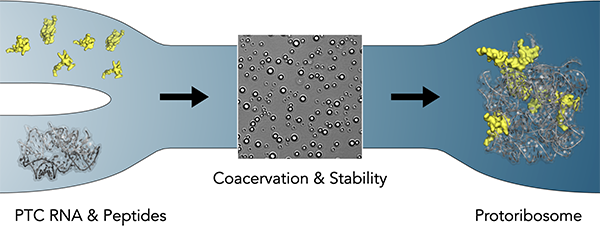[This is a Joint Press Release with the Charles University, University of Chemistry and Technology in Prague, and University of Milano]
Scientists have uncovered new insights into the protoribosome, a molecular fossil within the ribosome, which plays a key role in the origin of life on Earth. This research, published in Nucleic Acids Research, could reshape our understanding of early ribosomal evolution and its significance for the development of life. The study’s research team includes Dr. Klára Hlouchová from Department of Cell Biology of the Faculty of Science, Charles University and Associate Professor, Dr. Kosuke Fujishima of the Earth-Life Science Institute at the Institute of Science Tokyo (formerly Tokyo Institute of Technology).

Life as we know it nowadays relies on the intimate connection among nucleic acids, storing information, proteins, performing countless tasks, and lipids forming surrounding membranes. “These interactions among molecular precursors started to occur more than 4 billion years ago before the first life emerged,” says Dr. Klára Hlouchová from the Charles University, one of the study’s lead researchers. Cells contain ribosomes, molecular machines which produce proteins. Due to their omnipresence and high conservation across all life forms, ribosomes qualify as ancient molecular fossils, attracting evolutionary biologists as the best connection to our biological past.
Key discovery
The protoribosome surrounds the peptidyl transferase center (PTC), which is responsible for peptide bond formation—an essential process in protein synthesis. Previous studies showed that RNA alone could exhibit PTC activity. However, in the ribosomal structure, “tails” of several ribosomal proteins (rPeptides) are located in proximity of the PTC and have been implied as relics of the most ancient peptide species that probably interacted with the protoribosome before the ribosome evolved into the RNA-protein complex as we know it today. The role of these rPeptides has not been studied so far.
This new investigation reveals that the rPeptides have a critical role in driving compartmentalization and hence stability of the protoribosome. Two distinct evolutionary stages of the protoribosomal RNA have been studied here – The 617- and 136-nucleotide (“big” and “small”) constructs. The small construct (linked to the previously shown PTC activity) is more structurally flexible and while it interacts with rPeptides with lower specificity, the peptides induce coacervation—a process that helps form liquid-like droplets—across a wide concentration range. This, in turn, protects RNA from degradation. The big construct, on the other hand, is structurally more defined, as shown by atomistic computer simulations performed by the group of associate professor Michal H. Kolář at University of Chemistry and Technology in Prague. The protoribosomal RNA in the big construct interacts with the rPeptides with higher specificity and coacervation of this complex is less prominent than of the small construct.
The distinct properties of the two protoribosomal stages suggest that rPeptides initially provided compartmentalization and prevented RNA degradation, preceding the emergence of specific RNA-protein interactions crucial for the structural integrity of the contemporary ribosome.
Evolutionary Implications
The research suggests that the interaction between RNA and proteins before the first life emerged, offered a significant biophysical advantage, especially by providing compartmentalization and preventing RNA from degradation. These early RNA-protein interactions are seen as a precursor to the more complex RNA-protein relationships that are essential for ribosomal structural integrity today.
The research was funded by Human Frontiers Science Foundation and the 4EU+ European University Alliance.
Reference
Simone Codispoti1,†, Tomoko Yamaguchi2,3,†, Mikhail Makarov3, Valerio G. Giacobelli3, Martin Mašek4, Michal H. Kolář4, Alma Carolina Sanchez Rocha3, Kosuke Fujishima2,5,*, Giuliano Zanchetta1,* and Klára Hlouchová3,6,*, The interplay between peptides and RNA is critical for protoribosome compartmentalization and stability, Nucleic Acids Research, DOI: 10.1093/nar/gkae823
- Dipartimento di Biotecnologie Mediche e Medicina Traslazionale, Università di Milano, Segrate 20054, Italy
- Earth-Life Science Institute, Tokyo Institute of Technology, 2-12-1 Ookayama, Meguro-ku, Tokyo 152-8550, Japan
- Department of Cell Biology, Faculty of Science, Charles University, 7, Prague 12800, Czech Republic
- Department of Physical Chemistry, University of Chemistry and Technology, Technicka 5, 16628 Prague, Czech Republic
- Graduate School of Media and Governance, Keio University, 5322 Endo, Fujisawa 252-0882, Japan
- Institute of Organic Chemistry and Biochemistry, Czech Academy of Sciences, Flemingovo n. 2, Prague 16610, Czech Republic
* To whom correspondence should be addressed. Tel: +420 221951801; Email: klara.hlouchova@natur.cuni.cz
Correspondence may also be addressed to Kosuke Fujishima. Email: fuji@elsi.jp
Correspondence may also be addressed to Giuliano Zanchetta. Email: giuliano.zanchetta@unimi.it
† The first two authors should be regarded as Joint First Authors.
Present address: Tomoko Yamaguchi, Department of Structural Biology, Graduate School of Pharmaceutical Sciences, Kyoto University, 46-29 Yoshida-Shimo-Adachi-cho, Sakyo-ku, Kyoto 606-8501, Japan
Press release source: https://natur.cuni.cz/en/news/5251-new-study-sheds-light-on-ancient-protoribosome-and-its-role-in-early-life-evolution
Contacts:
Thilina Heenatigala
Director of Communications
Earth-Life Science Institute (ELSI),
Tokyo Institute of Technology
E-mail: thilinah@elsi.jp
Tel: +81-3-5734-3163 / +81-3-5734-3416
Kosuke Fujishima
Associate Professor
Earth-Life Science Institute (ELSI),
Tokyo Institute of Technology
E-mail: fuji@elsi.jp
Tel: +81-3-5734-2126
